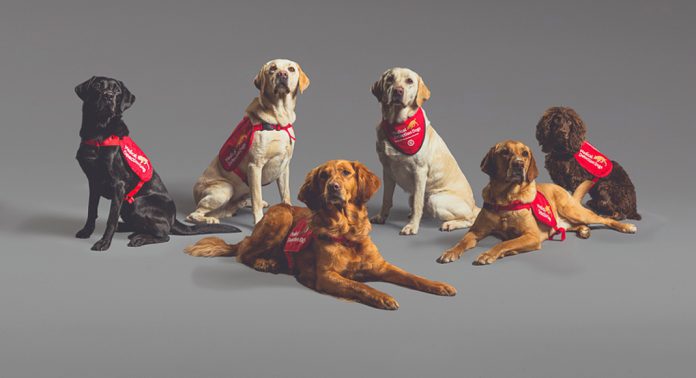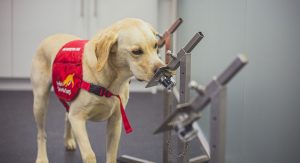
Claire Guest, Co-Founder, CEO and Chief Scientific Officer of Medical Detection Dogs, outlines how the charity is training dogs to detect COVID-19.
Medical Detection Dogs is a UK-based charity committed to improving diagnostic procedures and patient outcomes through the use of specially trained dogs who are able to detect the odour of human disease. Earlier this year, the organisation collaborated with the London School of Hygiene & Tropical Medicine (LSHTM) and Durham University as part of a study to see if the detection dogs could identify the unique odour of the SARS-CoV-2 virus. Researchers discovered that the medical detection dogs were not only able to detect the virus in individuals with varying viral loads but could alert them to those who are asymptomatic as well as people carrying two different viral strains. With an impressive 94.3% sensitivity rate and up to 92% specificity, this accurate tracing method could be much more reliable than lateral flow tests and quickly identify those people who need to isolate themselves and take a PCR test.
Special medical detection dogs are now being trained in real-world settings including workplaces, events and conferences, offering a non-invasive and rapid method of detection that could help curb the onward spread of the virus and, ultimately, offer a strong line of defence against the pandemic. With one dog capable of checking up to 250 people per hour, mass screening could be rolled out in busy public areas helping to reduce transmission by up to 30% and thus making those areas safer for everyone. To find out more, Health Europa spoke to Medical Detection Dog’s Chief Scientific Officer and the Principal Investigator on the trial, Claire Guest.
Can you tell me about the process in training the dogs to detect COVID-19?
In phase 1 of our trials, we train our dogs on a stand system, this enables us to teach our dogs to discriminate between a control sample and a sample (sweat samples) that has been collected from an individual who is COVID-19 positive. When the dogs have understood this scent discrimination, they move on to phase 2 of our project, passive search, whereby dogs search people for the odour, and learn to detect the odour on collected T-shirt samples.
What advantages could this method of detection offer in comparison to current COVID-19 tests? What level of accuracy did you see from this trial?
In phase 1 of our trials our dogs were able to detect COVID-19 positive individuals with up to 94% accuracy and this method of screening is rapid, non-invasive, and reliable regardless of an individual’s symptoms or viral load. The canine screen test would fit within a screen and test regime where individuals who were carrying the virus, but may be asymptomatic or pre-symptomatic, could be rapidly identified and then confirmed using a PCR test. The dogs’ ability to detect lower viral load than the lateral flow test means that this could greatly reduce onwards transmission of the virus particularly in environments such as mass gatherings.

Have you faced any unexpected challenges or setbacks over the course of the trial?
In the training of medical detection dogs, sample availability is paramount. Unfortunately, we obtained our ethical approval of this study at a time where positive cases were decreasing over the summer months of 2020 and therefore it slowed our project progress and training.
In which types of environments or real-world settings could the dogs be employed to detect COVID-19?
We hope that our passive search dogs will be deployed in the future at ports of entry such as airports, events and mass gatherings and places of work.
What are your plans for the trial moving forward?
Our plans for the trial include:
- Run operational trials at large events to assess feasibility of dogs as a rapid screen in a real-world environment;
- Explore the use of dogs at other venues including stadia, sporting events, music events and work places; and
- Define and implement the route to deployment and scale up within the UK and overseas, particularly in low- and middle-income countries.
Dr Claire Guest
BSc. (Hons) MSc. HonDSc. DHP BCAh
Co-Founder, CEO and Chief Scientific Officer
Medical Detection Dogs
www.medicaldetectiondogs.org.uk
https://twitter.com/MedDetectDogs?ref_src=twsrc%5Egoogle%7Ctwcamp%5Eserp%7Ctwgr%5Eauthor
This article is from issue 19 of Health Europa Quarterly. Click here to get your free subscription today.









